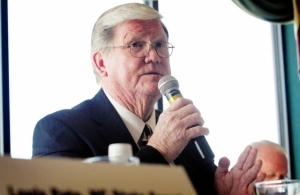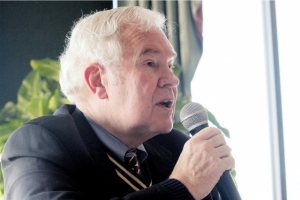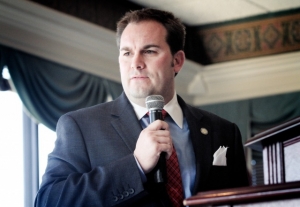Wayne County's three Republican legislators share thoughts on session with Chamber
By Matthew Whittle
Published in News on March 24, 2013 1:50 AM

News-Argus/TROY HERRING
State Rep. Jimmy Dixon, R-Duplin, answers questions during a question-and-answer forum as he and other legislators take part in a legislative breakfast held at Lane Tree Golf Club early Friday morning.

News-Argus/TROY HERRING
N.C. State Sen. Louis Pate, R-Wayne, speaks about some of the issues facing North Carolina on Friday.

News-Argus/TROY HERRING
N.C. State Rep. John Bell IV, R-Wayne, listens to a questioner during the legislative breakfast Friday.
Speaking at a legislative breakfast event, Wayne County's three Republican legislators took time Friday morning to discuss the issues facing the North Carolina General Assembly, including Gov. Pat McCrory's proposed $20.6 billion budget.
Overall, the three said they are pleased with the job the GOP majority has done so far in improving the state's prospects for the future, and that they see the governor's budget as a good starting point, though each had several line items they would like to see changed.
The breakfast, which was hosted by the Wayne County Chamber of Commerce at Lane Tree Golf Club, also gave Sen. Louis Pate, R-Wayne, Rep. John Bell IV, R-Wayne, and Rep. Jimmy Dixon, R-Wayne, a chance to hear what was on the minds of the county's business community, based on the questions asked by those gathered.
Among the issues discussed were the budget, tax reform, jobs, railroads, early childhood education, Medicaid and fracking.
Tax reform
All three agreed that tax reform is inevitable, but that it needs to progress slowly. In particular, all three agreed that they would like to see both the personal and corporate income taxes eventually eliminated and the state sales tax broadened and lowered to make up the revenue. They also agreed with the governor's current proposal to eliminate the state estate tax.
"It's not going to happen overnight," Pate said.
The key, Dixon explained, will be to make sure the revenue streams balance out so as not to harm the state.
"We don't want to replace one mistake with another," he said. "We cannot afford to make mistakes on the way we generate revenue."
And, Bell said, some of the proposals that have been floated so far would have been mistakes, which is why they want everybody at the table to discuss all the options -- such as, whether services should be included in a state sales tax, and if so, which ones.
However, Bell noted that the General Assembly has already taken some steps toward making tax reform a reality by limiting the unemployment taxes paid by businesses, capping the low-income tax credit and rejecting the federal Medicare expansion.
Ultimately, Pate said, if successful, tax reform should help invigorate North Carolina's economy.
"I believe we need to compete better with some of our surrounding states," he said. "(The income tax) has probably outlived its usefulness. It's holding people back and keeping entrepreneurs from coming to our state. I think at the end of the day, we will be much better off and have a better economy."
Railroads
Also helping the state and the local economy, the legislators said, would be the completion of the rail line between Wallace and Castle Hayne -- an issue that all promised to continue to be vocal about.
"The bottom line is that it needs to be economical for the firm operating the railroad. They need to make money. But the bottom line is we need it. It is an avenue that would open us up in so many ways," Dixon said.
Jobs
Beyond tax reform and improving the state's infrastructure, the three cited regulatory reform and a continued focus on vocational education as the biggest steps being taken right now to improve the state's business climate. But again, they said, regulatory reform is another one of those areas that has to be approached carefully.
"We need to regulate ourselves," Dixon said. "We need regulation. But we need the proper amount of regulation."
And right now, he said, they are working with regulatory agencies such as the Department of Environment and Natural Resources to figure out where that balance might be.
"The regulatory community is seeing the light and they're finally understanding that the people they are regulating are the customers," Dixon said.
For Pate, the key is the education component and creating a well-educated, job-ready work force, focusing primarily on vocational efforts in elementary, middle and high schools, as well as in the community colleges -- something he noted that is done well in Wayne County.
"We need to educate people to take a job," he said.
Fortunately, Bell added, the state is moving toward many of these goals -- a fact that he believes will begin to pay dividends itself.
"What we want to do is not only entice businesses to come to North Carolina, but also to stay in North Carolina," he said. "The hope is that by June, some of what we've done will have put some confidence back in our business owners."
Pre-k education
But vocational education wasn't the only education piece discussed Friday. The legislators also voiced their general support for the governor's $9.1 million request to add 5,000 more at-risk 4-year-olds to the state's pre-kindergarten programs.
"I believe, especially the pre-k program (More at Four) has proven to be good for children. We need to expand that program," he said.
Plus, Pate noted after the formal program was over, the state is under a court order to provide pre-kindergarten to all eligible children, so "we have to do it, whether we like it or not."
The key, though, all three noted, will be to work to make sure the programs are being run as efficiently as possible, and not just to simply increase the funding.
Medicare expansion
The Medicare expansion issue was another where there was little to no disagreement among the legislators, with each having voted to reject it -- primarily because there was no guarantee that the federal government would continue to pay its portion once the state expanded its rolls, especially with North Carolina already facing a $1 billion Medicare shortfall for this year.
And part of that problem, Pate said, is because of the waste and fraud that's been identified with the program -- though the hope is that the state's new billing systems will address that issue.
"It was a bipartisan effort and the fact is, we just simply cannot afford it," Bell said.
Fracking
One of the last specific issues discussed during the formal meeting portion was fracking. And again, while all three legislators supported allowing the natural gas drilling procedure in North Carolina, they also indicated that they understood the need to move slowly and make sure it's done right, because if it is, Dixon noted, the actual fracking process only occurs during a small portion of the 40 to 60 years of economic and energy benefits the state can expect to receive from each well.
"We need to be certain we understand what we're doing," Pate said. "We need to look closely at the geology and be absolutely certain we're doing the right thing."
And even if drilling for natural gas doesn't occur immediately with prices currently down, he added, "we will need that energy in the future and we need to be ready for it."
Other issues
Other issues noted by the legislators included the need to protect North Carolina's military installations, as well as the need to protect its agriculture economy.
For Bell, whose district includes people tied closely to both Seymour Johnson Air Force Base and Cherry Point Marine Corps Air Station, the military issue is one that he said he is particularly focused on.
"We have to protect our military installations. We would never recover from losing those. Eastern North Carolina would be a welfare state," he said.
Dixon, though, held agriculture up as equally important, noting that "we all need food and fiber."
While for Pate, all of those issues tie into the biggest point of emphasis -- growing the economy.
"The government doesn't create jobs. Private business creates jobs," he said. "But the government can create the infrastructure necessary for that to happen and then get out of the way and let the economy grow."
